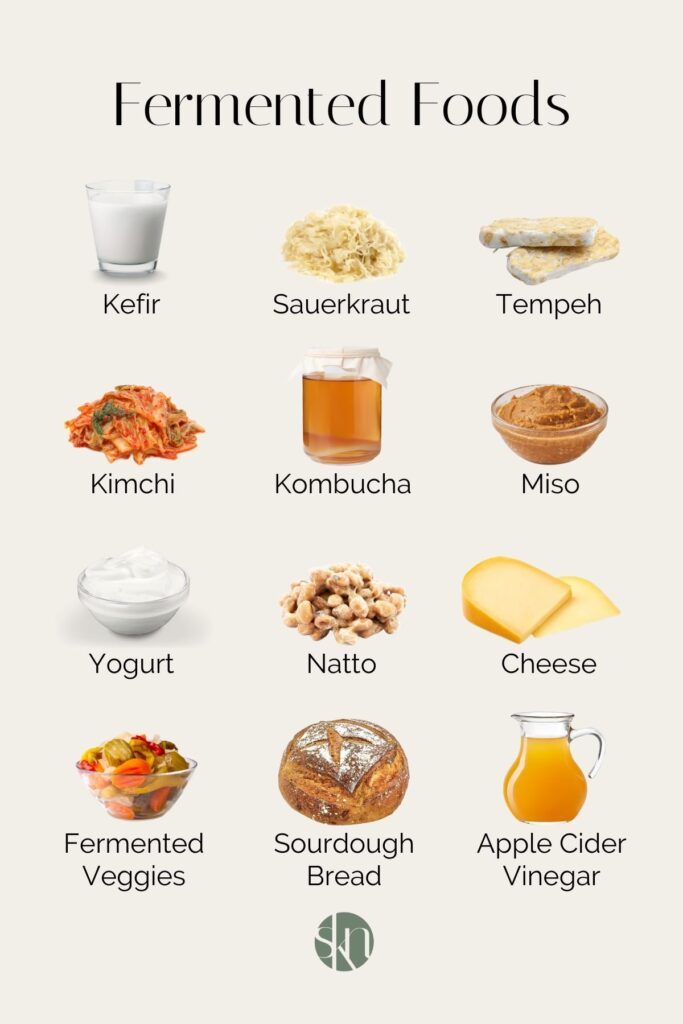Fermented Foods for Gut Health Benefits
Fermented Foods for Gut Health: Kefir, Kimchi & More
In recent years, fermented foods for gut health have gained popularity among nutritionists and wellness enthusiasts. These foods, such as kefir and kimchi, are not only flavorful but also packed with probiotics that support a balanced digestive system. Understanding how these fermented options work can help you make better dietary choices to improve your intestinal health.

What Are Fermented Foods?
Fermented foods are those that have undergone a natural process involving bacteria and yeast. During fermentation, microorganisms break down sugars and starches, creating beneficial compounds like lactic acid and probiotics. Kefir, kimchi, sauerkraut, yogurt, and miso are just a few popular examples.
Moreover, the fermentation process enhances the nutritional profile of these foods. It increases the bioavailability of vitamins and introduces helpful bacteria to the gut. Therefore, incorporating fermented items into your diet can offer both immediate and long-term benefits.
Why Fermented Foods for Gut Health Matter
Fermented foods for gut health are rich in live bacteria, also known as probiotics. These probiotics help maintain a healthy gut microbiome, a community of microorganisms crucial for digestion, immunity, and even mental health.
In addition, a balanced gut microbiome can reduce bloating, support regular bowel movements, and lower inflammation. As a result, people often experience better digestion and overall well-being when regularly consuming fermented foods.
Kefir: A Probiotic Powerhouse
Among the most beneficial fermented foods for gut health, kefir stands out due to its high probiotic content. This tangy, yogurt-like drink is made by fermenting milk with kefir grains, which contain a mixture of bacteria and yeasts.
One of kefir’s unique traits is its diversity of probiotics, often containing more strains than yogurt. Furthermore, kefir is typically easier to digest, even for people who are lactose intolerant. This is because the fermentation process breaks down much of the lactose content.
Incorporating kefir into your breakfast smoothie or using it as a base for dressings can be a delicious way to support your gut health daily.
Kimchi and Other Fermented Foods for Gut Health
Kimchi, a staple in Korean cuisine, is another excellent option among fermented foods for gut health. Made primarily from cabbage, radish, and spices, it ferments over days or weeks to develop its complex flavors and probiotic profile.
Kimchi is not only rich in lactobacilli, a type of beneficial bacteria, but also in fiber and antioxidants. Moreover, the spicy ingredients like garlic and ginger add natural antimicrobial and anti-inflammatory properties.
However, it’s essential to choose unpasteurized kimchi, as pasteurization kills the live bacteria. Homemade or refrigerated versions are usually the best options for reaping full health benefits.
Digestive Perks of Fermented Foods
The probiotics found in fermented foods help restore the balance between good and bad bacteria in the intestines. This is especially important after taking antibiotics, which can disrupt the microbiome.
Additionally, fermented foods aid in breaking down nutrients, making them easier to absorb. For example, they can help synthesize B vitamins and increase the availability of minerals like iron and zinc.
As a result, you may notice improved digestion, reduced symptoms of irritable bowel syndrome (IBS), and even enhanced energy levels.
Fermented Foods for Gut Health and Mental Well-Being
Interestingly, gut health is closely linked to immune function and mental well-being. This connection is often referred to as the gut-brain axis. Fermented foods for gut health can positively influence this axis by promoting a diverse and balanced microbiome.
For instance, probiotics can help reduce the severity and duration of colds. Furthermore, studies show that people who consume probiotics regularly report lower levels of stress and anxiety.
While fermented foods are not a cure-all, they can serve as a valuable tool in maintaining both physical and mental health.
How to Add Fermented Foods to Your Routine
To begin, start slowly by adding one type of fermented food at a time. Your body may need a few days to adjust to the increased intake of live bacteria.
Here are some easy ways to include these gut-friendly foods in your meals:
- Breakfast: Add kefir to smoothies or pour it over granola.
- Lunch: Serve kimchi as a side dish or mix into grain bowls.
- Dinner: Use miso paste in soups or as a marinade.
- Snacks: Enjoy a small bowl of yogurt with honey or fruit.
In addition, make sure to read labels carefully. Look for terms like “live cultures” or “unpasteurized” to ensure the product still contains active probiotics.
Final Thoughts on Fermented Foods for Gut Health
Incorporating fermented foods for gut health into your daily routine is a simple yet powerful step toward better digestion, stronger immunity, and improved mental clarity. From the creamy tang of kefir to the spicy crunch of kimchi, these foods not only taste great but also nurture your body from the inside out.
As with any dietary change, start gradually and listen to your body. With consistency, you’ll likely notice positive effects that extend far beyond the digestive tract.
You might also be interested in:
